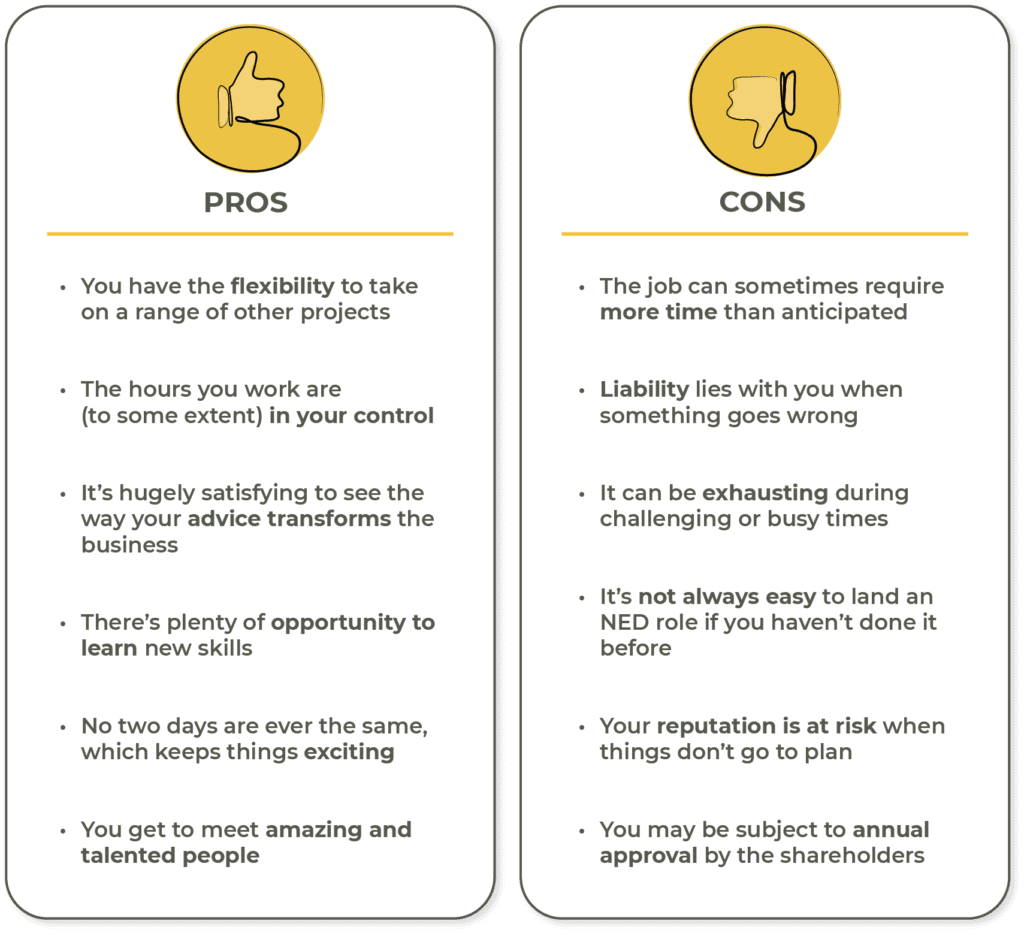Ben Legg
Years ago, the idea of becoming a non-executive director (NED) of a company may have felt like an exclusive club only available to corporate big wigs and titans of industry towards the end of their careers. However, it’s now easier than ever for portfolio professionals to join boards of directors. That’s because there are more companies with more diverse advisor needs.
Given that most of these companies are startups, old world corporate experience is less relevant than being able to help a company reinvent their industry. In fact, a significant number of people within The Portfolio Collective community are currently NEDs, proving that it’s a viable professional avenue open to independent talent with diverse backgrounds and levels of experience.
In our Fireside Chat: The Future as an NED, we tried to gather questions from around the community. Here’s everything you need to know about being a non-executive director.
What does it really mean to be an NED?
In addition to the governance basics, NED roles are created to provide insight and expertise – a concept most focused experts are already well-versed in. Essentially, you sit on a board that ensures independent oversight and constructive challenge to a business, helping to shape the organisation through your unique perspective and experiences. You use your expertise to mentor the organisation through decisions around strategy, fundraising, business model, talent and growth. Basically, you advise; you don’t get involved in the day-to-day operations.

Most of the time, you get paid pretty well to do this (you can learn more about NED pay structures in our other article here) with a mix of cash and stock options. The time commitment is light – typically a few days a month – which means you can fit NED work around other portfolio activities. With more and more start-ups breaking onto the scene, it means there has never been a better time to think about landing board roles.
Types of NED roles available may include:
- Non-executive chair: An independent position that cannot hold a managerial role within the company
- Senior non-executive director: Someone who supports the chairperson and leads the rest of the NEDs when the chair cannot
- Non-executive director: An independent member of the board that provides strategic guidance and isn’t involved in day-to-day operations
- Non-executive advisor: Someone brought in purely to provide advice on a particular area of expertise. Often part of an advisory board, which is different to the main board.
How can NED work benefit my portfolio career?
There are many reasons to take on an NED role besides just the money and flexibility. If you’re looking to shift onto more of a focused expert track, having NED experience under your belt can prove your professional savvy to potential clients. It’s also a great way to flex your emotional intelligence and problem solving muscles.

The best boards are ones that host a diversity of opinion, and being able to plead your case through informed insights and personal experience will directly influence your ability to pitch to clients who may be steadfast in their ways.
Being part of an NED board also allows you to:
- Expand your network. You get to meet and work with other experts outside your usual client base.
- Increase your professional status. NED roles are prestigious positions. When you take one on, it puts you in a better position for future jobs.
- Learn new skills. Clearly, you’re expected to add value in some areas, otherwise you wouldn’t have a board position. However, you’ll learn a lot about strategy, finance, funding, valuation, success, failure and leadership.
- Sharpen your mentorship capabilities. When you’re able to mentor a whole company, mentoring a single person is a breeze.
- Fulfil a need to give back to society. Helping others feels good. In fact, it has a positive effect on your mental health and promotes feelings of belonging and community.
Do I need to have 20+ years of experience to be an NED?
Not necessarily. You’ll be eligible if you can demonstrate the ability to add meaningful value to the CEO and organisation over a few years. That means you’re not a one idea person, but someone with an ability to always educate, challenge and support through the different stages of the company’s evolution over a diverse range of decisions that need to be made.
What challenges might I face as an NED?
Although the average time commitment for these types of roles is quite low, the workload can vary. Some periods are chaotic, others are slow and steady. It all depends on what’s happening with the business at that particular point in time. For example, during a fundraise or an IPO, or if you need to replace the CEO, it can get pretty intense.
NED roles also carry quite a lot of legal responsibility, which can be a bit daunting. This varies depending on the country you’re working in, which is why you should always research your legal duties as an NED. Also ensure that the company pays for director insurance for you.
Ultimately, it’s a different way of working than you might be used to. Rather than leading and instructing, you’re challenging and influencing – and that requires an ability to get things done through others rather than doing it yourself. If you prefer to do work that’s a bit more hands-on, this may not be the best route for you.
How can I determine if this is the right career move for me?
No two companies are ever really the same, so it makes sense that all NED roles are unique in their own way. The types of NED roles available differ depending on:
- The sector
- The type of business
- The funding stage of the business
- The size of and profitability the business
- Whether the business is local or international, private or public
- That particular board’s structure (some have several NEDs, some only have one)
On top of that, all companies have their own cultures, processes and working styles to take into consideration. That’s why interpersonal and soft skills are just as important as your expertise and experience. If you don’t have the right soft skills, you’ll struggle to make effective change.
It’s also worth noting that not all NED roles are paid. Some are pro bono trustee positions, others only pay expenses or offer sweat equity (i.e. stock options). That’s why it’s important to clarify the pay structure early on when considering a specific role.
It’s often helpful to line up the pros and cons side by side to get a clearer understanding of what you might like (and dislike) about being an NED.

What should I consider before accepting an NED role?
In most instances, NED roles aren’t massive time drainers. That being said, they’re not effortless either. You have to put a lot of work in, and your level of involvement may change as the company grows.
Before you say yes to any NED role you’re offered, make sure you consider the following:

Time commitment, travel requirements, fees
How many days a month are you expected to commit? Can you dial in remotely or do you have to travel to board meetings? What remuneration are they offering for your services?

Your level of commitment to the role
This is not a short-term project but a multi-year commitment. Do you love the company’s mission enough to give it so much time? Are you confident that you’ll get on with the CEO

Resources the organisation offers
Do they provide formal training or induction? Can they support with legal advice if a regulatory issue arises? Some start-ups might not have the funding for this, which is good to know early on.
Eager to learn more from real life experts?
We know that this is a lot of information to unpack, but it’s important to do the research before you commit to any new role. If you want a more personal perspective, there’s no better way to understand what a job entails than by speaking directly to someone who has been in that position. Don’t be afraid to reach out to our community and the TPC team to ask questions.
We also offer an in-depth guide on how to land an NED role, so if that’s of interest to you, then by all means check it out.
If you are interested in becoming an accredited, paid mentor as a stepping stone to NED roles, you can check out our Mentor Programme here.
Think this sounds like the right path for you? Come along to our monthly Community Welcome Call for new members to find out what a portfolio career could look like and how The Portfolio Collective can help you take those first steps towards professional success – and don’t forget to connect with our community!




4 responses to “Everything you need to know about NED board roles”
Also looking forward to digging into the future of NEDs next week with @mike-weston and Sarah Speake – Friday 1-2pm UK time, sign up here: https://portfolio-collective.com/events/fireside-chat-the-future-as-an-ned/
Great to have this article as a follow on from a really interesting chat last night! Thanks for joining us @damiends @peter-domican @vicmistry @caradelange @hgill @linhvle @lisasolomon @tinaorlando @peter-fayle @phoebeunatrain @rsaldanha @stephanie
Really enjoyed it and very useful. There’s just some things I have absolutely no idea about so great to get a primer.
That’s awesome – thanks Pete!